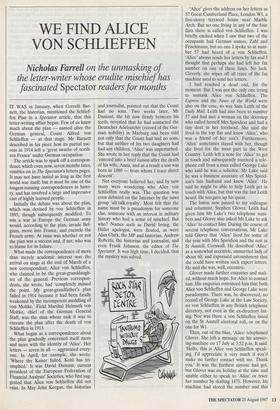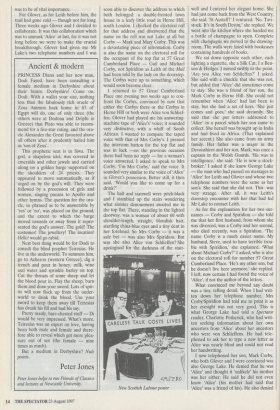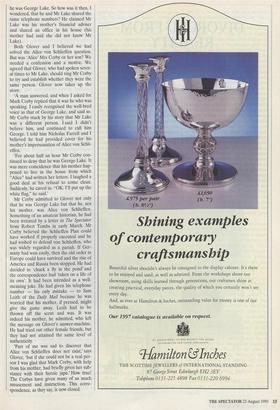WE FIND ALICE VON SCHLIEFFEN
Nicholas Farrell on the unmasking of the letter-writer whose erudite mischief has fascinated Spectator readers for months IT WAS in January, when Correlli Bar- nett, the historian, mentioned the Schlief- fen Plan in a Spectator article, that this letter-writing affair began. Few of us knew much about the plan — named after the German general, Count Alfred von Schlieffen — at that stage. Mr Barnett described in his piece how its partial suc- cess in 1914 left a 'great swathe of north- ern France' under German occupation.
The article was to spark off a correspon- dence which even now, seven months later, rumbles on in The Spectator's letters pages. It may not have lasted as long as the first world war itself, but it must be one of the longest-running correspondences in histo- ry, and has involved a large and impressive cast of highly learned people. Initially the debate was about the plan, which was devised by von Schlieffen in 1895, though subsequently modified. To win a war in Europe the German army would, according to the plan, invade Bel- gium, move into France, and encircle the French army. At issue was whether or not the plan was a success and, if not, who was to blame for its failure.
What made the correspondence of more than merely academic interest was the arrival on stage at the end of March of a new correspondent, Alice von Schlieffen, who claimed to be the great-granddaugh- ter of the general. Previous correspon- dents, she wrote, had 'completely missed the point. My great-grandfather's plan failed in 1914 because it had been fatally weakened by the incompetent meddling of von Moltke.' Field Marshal Helmuth von Moltke, chief of the German General Staff, was the man whose task it was to execute the plan after the death of von Schlieffen in 1913.
What began as a correspondence about the plan gradually concerned itself more and more with the identity of 'Alice'. Her letters — seven in all — aggravated every- one. In April, for example, she wrote: `Where the Kaiser failed, Kohl has tri- umphed.' It was David Damant, current president of the European Federation of Financial Analysts' Societies, who first sug- gested that Alice von Schlieffen did not exist. In May John Keegan, the historian and journalist, pointed out that the Count had no sons. Two weeks later, Mr Damant, the bit now firmly between his teeth, revealed that he had contacted the Deutsches Adelsarchiv (record of the Ger- man nobility) in Marburg and been told not only that the Count had had no sons, but that neither of his two daughters had had any children. 'Alice' was unperturbed. She wrote in her reply that the Count had `entered into a brief liaison after the death of his wife, Anna, and as a result a son was born in 1880 — from whom I trace direct descent'.
Not everyone believed her, and by now many were wondering who Alice von Schlieffen really was. The question was even debated on the Internet by the news group `alt.tallc.royalty'. Most felt that the name must be a pseudonym for someone else, someone with an interest in military history who had a sense of mischief. But who? Names such as David Irving, the Hitler apologist, were floated, as were Alan Clark, the MP and historian, Andrew Roberts, the historian and journalist, and even Frank Johnson, the editor of The Spectator. It was high time, I decided, that the mystery was solved. `Alice' gives the address on her letters as 57 Great Cumberland Place, London Wl, a five-storey terraced house near Marble Arch. But no one living in any of the four flats there is called von Schlieffen. I was briefly excited when I saw that two of the occupants had German names, Zahl and Frischmann, but no one I spoke to at num- ber 57 had heard of a von Schlieffen. `Alice' always sends her letters by fax and I thought that perhaps she had left her fax number on one of these faxes. No luck. Cleverly, she wipes off all trace of the fax machine used to send her letters.
I had reached a dead end, for the moment. But I was not the only one trying to unmask Alice von Schlieffen. The Express and the News of the World were also on the case, so was Sam Leith of the Daily Mail. Leith had also been to number 57 and had met a woman on the doorstep who called herself Mrs Spiridion and had a tiny dent in her forehead. She said she lived in the top flat and knew 'Alice', who was a friend of her son's. Furthermore, `Alice' sometimes stayed with her, though she lived for the most part in the West Country. Leith left a note for 'Alice' to get in touch and subsequently received a tele- phone call from a man called George Lake who said he was a solicitor. Mr Lake said he was a business associate of Mrs Spirid- ion's late husband and knew 'Alice'. He said he might be able to help Leith get in touch with Alice, but that was the last Leith heard. He too gave up his quest.
The baton now passed to my colleague and columnist, Stephen Glover. Leith had given him Mr Lake's two telephone num- bers and Glover also asked Mr Lake to ask `Alice' to contact him. During the course of several telephone conversations, Mr Lake told Glover that 'Alice' lived for some of the year with Mrs Spiridion and the rest in St Austell, Cornwall. He described 'Alice' as a somewhat eccentric, unmarried lady of about 60, and expressed astonishment that she could have written such expert letters. He said she was, well, eccentric.
Glover made further enquiries and wait- ed, without much hope, for Alice to contact him. His enquiries convinced him that both Alice von Schlieffen and George Lake were pseudonyms. There was, he discovered, no record of George Lake at the Law Society, no von Schlieffen in any British telephone directory, not even in the ex-directory list- ing. Nor was there a von Schlieffen listed on the St Austell electoral roll, or on the one for Wl.
Then, out of the blue, 'Alice' telephoned Glover. She left a message on his answer- ing-machine on 17 July at 3.52 p.m. It said: `Hello, this is Alice von Schlieffen speak- ing. I'd appreciate it very much if you'd make no further contact with me. Thank you.' It was the furthest anyone had got, but Glover was on holiday at the time and unable either to speak to 'Alice' or trace her number by dialling 1471. However, his machine had stored the number and this was to be of vital importance.
For Glover, as for Leith before him, the trail had gone cold — though not for long. Three weeks ago Glover and I decided to collaborate. It was this collaboration which was to unmask 'Alice' at last, for it was not long before we were to make the crucial breakthrough. Glover had given me Mr Lake's two telephone numbers and I was soon able to discover the address to which both belonged: a double-fronted town house in a leafy little road in Herne Hill, south London. I checked the electoral roll for that address and discovered that the name on the roll was not Lake at all but Corby — Mark and Mary Corby. This was a devastating piece of information. Corby is also the name on the electoral roll for the occupant of the top flat at 57 Great Cumberland Place — Gail and Michael Corby, not Spiridion as Leith of the Mail had been told by the lady on the doorstep. The Corbys were up to something, which would soon become clear.
I returned to 57 Great Cumberland Place one evening two weeks ago to con- front the Corbys, convinced by now that either the Corbys there or the Corbys in Herne Hill or both were Alice von Schlief- fen. Glover had played me his answering- machine tape of 'Alice's' voice; it sounded very distinctive, with a whiff of South African. I wanted to compare the taped voice with that of Mrs Corby's. I pressed the intercom button for the top flat and was in luck —on the previous occasion there had been no reply — for a woman's voice answered. I asked to speak to Mrs Corby. 'I'm Mrs Corby,' said the voice. It sounded very similar to the voice of 'Alice' in Glover's possession. Better still, it then said, 'Would you like to come up for a drink?'
The hall and stairwell were pitch-black and I stumbled up the stairs wondering what sinister denouement awaited me in the top flat. There, standing in the lighted doorway, was a woman of about 60 with shoulder-length, straight, blondish hair, startling china-blue eyes and a tiny dent in her forehead. So Mrs Corby — it was a safe bet — was also Mrs Spiridion. But was she also Alice von Schlieffen? She apologised for the darkness of the stair- New Scottish Labour poster well and I entered her elegant home. She had just come back from the West Country, she said. 'St Austell?' I ventured. 'No. Tavi- stock. It's in South Devon,' she replied. We went into the kitchen where she handed me a bottle of champagne to open. Complete with champagne we moved to the drawing- room. The walls were lined with bookcases containing hundreds of books.
We sat down opposite each other, each lighting a cigarette, she a Silk Cut, I a Ben- son & Hedges. I moved swiftly to the point. `Are you Alice von Schlieffen?' I asked. She said with a chuckle that she was not, but added that 'Alice' did sometimes come to stay. She was a friend of her son, the Mark Corby in Herne Hill. She could not remember when 'Alice' had last been to stay, but she had a set of keys. 'She just comes and goes,' she said dreamily. She said that she put letters addressed to `Alice' in a parcel which her son came to collect. She herself was brought up in India and had lived in Africa. (That explained her accent.) She also came from an army family. Her father was a major in the Devonshires and her son, Mark, was once a captain in the Welsh Guards. 'He was in intelligence,' she said. 'He is now a stock- broker.' I asked if she knew George Lake — the man who had passed on messages to `Alice' for Leith and Glover and whose two telephone numbers were the same as her son's. She said that she did not. This was very strange. After all, it was Leith's doorstep encounter with her that had led Mr Lake to contact Leith.
As for the explanation for her two sur- names — Corby and Spiridion — she told me that her first husband, from whom she was divorced, was a Corby and her second, who died recently, was a Spiridion. 'The name Corby is a much easier name. My husband, Steve, used to have terrible trou- ble with Spiridion,' she explained. 'What about Michael Corby?' I asked, who is also on the electoral roll for number 57 Great Cumberland Place. 'He's my other son, but he doesn't live here anymore,' she replied. I left, now certain I had found the voice of `Alice', if not the author of the letters.
What convinced me beyond any doubt was a tiny, telling detail. When I had writ- ten down her telephone number, Mrs Corby/Spiridion had told me to print it as her eyesight was not very good. This is what George Lake had told a Spectator reader, Charlotte Petherick, who had writ- ten seeking information about her own ancestors from 'Alice' about her ancestors who were von Schlieffens. He had tele- phoned to ask her to type a new letter as Alice was nearly blind and could not read her handwriting.
I now telephoned her son, Mark Corby, who both Glover and I were convinced was also George Lake. He denied that he was `Alice' and thought it 'unlikely' his mother was her either. He said he did not even know 'Alice' (his mother had said that `Alice' was a friend of his). He also denied he was George Lake. So how was it then, I wondered, that he and Mr Lake shared the same telephone numbers? He claimed Mr Lake was his mother's financial adviser and shared an office in his house (his mother had said she did not know Mr Lake).
Both Glover and I believed we had solved the Alice von Schlieffen question.
But was 'Alice' Mrs Corby or her son? We needed a confession and a motive. We agreed that Glover, who had spoken sever- al times to Mr Lake, should ring Mr Corby to try and establish whether they were the same person. Glover now takes up the story.
`A man answered, and when I asked for Mark Corby replied that it was he who was speaking. I easily recognised the well-bred voice as that of George Lake, and said so. Mr Corby stuck by his story that Mr Lake was a different person. I said I didn't believe him, and continued to call him George. I told him Nicholas Farrell and I believed he had provided cover for his mother's impersonation of Alice von Schli- effen.
Tor about half an hour Mr Corby con- tinued to deny that he was George Lake. It was mere coincidence that his mother hap- pened to live in the house from which "Alice" had written her letters. I laughed a good deal at his refusal to come clean. Suddenly, he caved in. "OK. I'll put up the white flag," he said.'
Mr Corby admitted to Glover not only that he was George Lake but that he, not his mother, was Alice von Schlieffen. Something of an amateur historian, he had been irritated by a letter in The Spectator from Robert Tombs in early March. Mr Corby believed the Schlieffen Plan could have worked if properly executed and he had wished to defend von Schlieffen, who was widely regarded as a pariah. If Ger- many had won easily, then the old order in Europe could have survived and the rise of America and Russia been stopped. He had decided to 'chuck a fly in the pond' and the correspondence had 'taken on a life of its own'. It had been intended as a well- meaning joke. He had given his telephone number — his only mistake — to Sam Leith of the Daily Mail because he was worried that his mother, if pressed, might give the game away. Leith had to be thrown off the scent and was. It was indeed his mother, he admitted, who left the message on Glover's answer-machine. He had tried out other female friends, but they had not attained the same level of authenticity.
`Part of me was sad to discover that Alice von Schlieffen does not exist,' says Glover, tut if she could not be a real per- son I was glad that Mark Corby, with help from his mother, had briefly given her sub- stance with their heroic jape.' How true! The Corbys have given many of us much amusement and instruction. This corre- spondence, as they say, is now closed.




























































 Previous page
Previous page